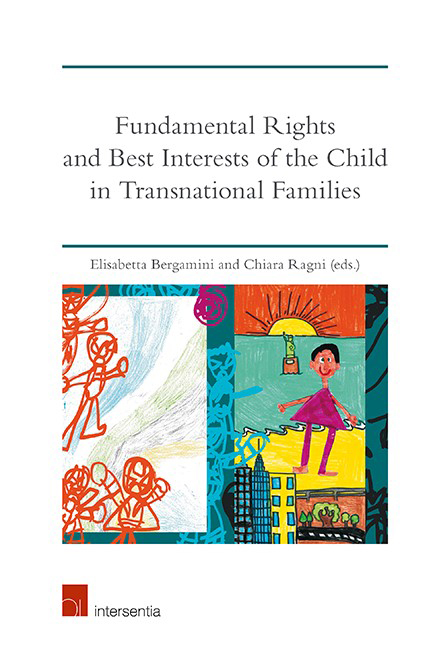Book contents
- Frontmatter
- Dedication
- Preface
- Acknowledgements
- Contents
- List of Cases
- List of Authors
- PART I THE IMPACT OF HUMAN RIGHTS AND OF THE BEST INTERESTS OF THE CHILD ON EU FREE MOVEMENT AND MIGRATION LAW
- Human Rights of Children in the EU Context: Impact on National Family Law
- Protecting EU Citizen Minors' Right to Identity in the Transnational Family Context
- The Best Interests Principle's Impact on Decisions Concerning Asylum-Seeking and Refugee Children
- Human Rights and the Best Interests of the Child in European Family Reunification Law
- Rainbow Families and EU Free Movement Law
- Kafala and Family Reunification of Third-Country Nationals
- Against a Girl's Will: Child Marriages, Immigration and the Directive on Family Reunification
- PART II THE BEST INTERESTS OF THE CHILD AS A CONCERN OF HUMAN RIGHTS AND EUROPEAN PRIVATE INTERNATIONAL LAW
- Index
- About the Editors
The Best Interests Principle's Impact on Decisions Concerning Asylum-Seeking and Refugee Children
from PART I - THE IMPACT OF HUMAN RIGHTS AND OF THE BEST INTERESTS OF THE CHILD ON EU FREE MOVEMENT AND MIGRATION LAW
Published online by Cambridge University Press: 12 November 2019
- Frontmatter
- Dedication
- Preface
- Acknowledgements
- Contents
- List of Cases
- List of Authors
- PART I THE IMPACT OF HUMAN RIGHTS AND OF THE BEST INTERESTS OF THE CHILD ON EU FREE MOVEMENT AND MIGRATION LAW
- Human Rights of Children in the EU Context: Impact on National Family Law
- Protecting EU Citizen Minors' Right to Identity in the Transnational Family Context
- The Best Interests Principle's Impact on Decisions Concerning Asylum-Seeking and Refugee Children
- Human Rights and the Best Interests of the Child in European Family Reunification Law
- Rainbow Families and EU Free Movement Law
- Kafala and Family Reunification of Third-Country Nationals
- Against a Girl's Will: Child Marriages, Immigration and the Directive on Family Reunification
- PART II THE BEST INTERESTS OF THE CHILD AS A CONCERN OF HUMAN RIGHTS AND EUROPEAN PRIVATE INTERNATIONAL LAW
- Index
- About the Editors
Summary
INTRODUCTORY REMARKS
Children's migration in the European Union represents a broad, difficult challenge for both European and international systems. Migrant children are a heterogeneous category, including unaccompanied children outside their country of origin, children accompanied by their families, other relatives or previous legal or customary primary caregivers and children seeking asylum or other forms of international protection.
Despite the extent and complexity of children's migration in Europe, their common feature is extreme vulnerability. According to the United Nations High Commissioner for Refugees (UNHCR), child asylum seekers and refugees are among the world's most vulnerable groups, needing appropriate protection and humanitarian assistance. Recognition of this special vulnerability determines States’ obligation to take appropriate measures to ensure that every child seeking refugee status or considered a refugee according to applicable international or domestic law and procedures, whether unaccompanied or accompanied, receives appropriate protection and humanitarian assistance in the enjoyment of the applicable rights set forth in international and European human rights or humanitarian instruments relevant to the States.
Because of such children's vulnerability, States are obliged in particular to ensure an especially broad, complete protection at every stage of the migration process, from their access to the territory to the identification procedure, from interim care and protection measures to determination of refugee or protection status: child asylum seekers and refugees should not be refused access to the territory; their identification should be prioritised and prompt, they should be registered through age-appropriate interviews to collect bio data and social history information immediately after arrival, and every child's views and wishes should be elicited and considered. Children's applications to refugee status should be prioritised and every effort made to reach a decision promptly and fairly. Considering their vulnerability and special needs, asylum-seeking children, particularly the unaccompanied, are actually entitled to special care and protection, to avoid a condition of legal uncertainty that risks undermining the full enjoyment of their rights and proper development.
The challenge of guaranteeing these children special protection is, however, very difficult due to the level of fragmentation that generally characterises the legal framework of migrant children's protection, but in particular children seeking asylum.
- Type
- Chapter
- Information
- Publisher: IntersentiaPrint publication year: 2019



